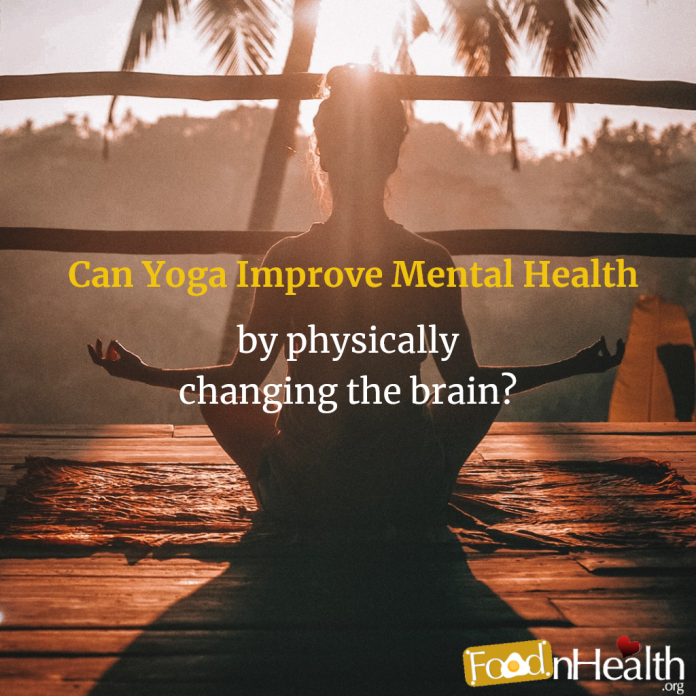It’s no surprise that one of yoga’s core tenants is to reduce agitation and quieten the mind. With one in four people affected by mental health disorders at some point in their lives, yoga is increasingly being viewed as an effective strategy that can protect and restore the mental health of individuals throughout the world.
However with such claims, there exists a wealth of scientific research that’s trying to understand what exactly happens in the brain when we practice yoga, and how does it help us? In addition to practicing yoga, you can explore online therapy options such as BetterHelp at your convenience.
Increasing neural connections to stay youthful
In a study by the University of California, and published in the Journal of Alzheimer’s Disease, researchers tested the effect of yoga on performance and memory tests, for subjects with mild cognitive impairment.
The research examined 29 middle-aged and older adults who had previously reported that they were anxious about the state of their memory. During evaluations by the University, the group was found to have a mild cognitive impairment, a mental condition that can be a precursor to dementia.
All the subjects were separated into two groups, with one group undergoing a dedicated “brain training” program – a series of mental exercises designed to increase brain function – while the other group practiced yoga for 1 hour per week.
After a period of 12 weeks, both groups underwent brain scans to analyze the various results. While both groups performed better in the majority of tests, intriguingly only those who practiced yoga showed increased communication between the areas of the brain responsible for attention.
In effect, yoga had equaled and then surpassed the benefits of dedicated 12 weeks brain training program. The research highlighted that the regions of the brain associated with attention and sensory processing (which often diminish over the years) remain more youthful in those who practice yoga.
Changing brain chemistry to help anxiety
It’s no real surprise that alcohol, cannabis, and tranquilizers are substances frequently used to help relieve anxiety. They work – temporarily at least – by boosting the levels of the particular neurotransmitters in the brain called GABA (gamma-aminobutyric acid).
While GABA occurs naturally within the brain, it actually inhibits (rather than promoting) signals in the brain. If our levels of GABA are too low, our neurons fire too easily and too often, and it can result in feelings of anxiety and depression.
Boosting the levels of GABA throughout the brain is a well-documented approach to treating anxiety, often through a combination of prescriptions and/or supplements; but a landmark study by Streeter et al in 2007 revealed that just one hour of yoga practice was correlated with statistically significant increases in GABA.
The yoga practitioners reported improved mood and anxiety compared to the control group, and MRIs showed increased GABA in some areas of the brain. Yoga has been taught to positively change our brain chemistry, helping to reduce feelings of anxiety and depression.
Rewiring the brain to break habits
The ability to adapt to a particular situation, to shift our perspective and to choose the best course of action, is often referred to as psychological flexibility.
The simple premise is that by acknowledging that life is full of change, it can become easier to confront things head-on, learning from life’s lessons as we go and use any negativity to either motivate or adjust our own behavior.
People with chronic pain, anxiety, post-traumatic stress, and depression, often find it difficult to shift their perception of a situation, and importantly how they react to it. In a study published by Gard in 2015, researchers demonstrated that our brains change, depending on psychologically flexible we are.
Comparing the brains of yogis with non-yogis, Gard found that yogi’s had a high level of connectivity in an area of the brain called the ‘caudate’. The caudate is part of an area of the brain called the basal ganglia, and both the caudate and the basal ganglia interact with the motor networks of the brain, and a variety of functions including procedural routine behaviors, or more simply – habits.
The research revealed that this increased connectivity throughout the caudate and other areas of the brain could help to help to promote psychological flexibility. Essentially yogi’s were better equipped that deal with change.
Attempting to shifting habits and dismantling deeply entrenched negative ways of thinking is an uphill battle at best. If yoga offers us a chance to improve how our brain functions, without the need to fight these embedded ways of thinking, it makes the arduous task of self-transformation just a little easier. Arguably well suited for treating conditions like anxiety, depression, and PTSD.
For some, yoga practice might serve as a substitute for other forms of therapy, while for others it might be a much-needed complement to primary intervention. But the wealth of research indicates through solid evidence what many yoga practitioners have always felt – that yoga keeps us sharp and mentally balanced, by changing how our brain physically works.


























